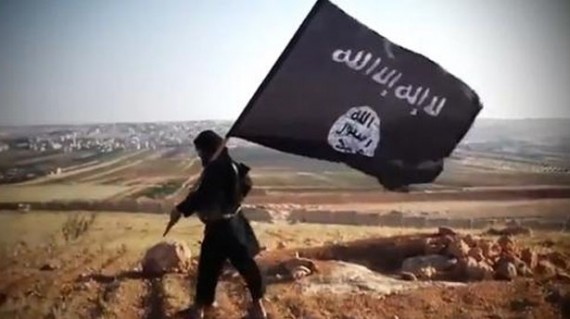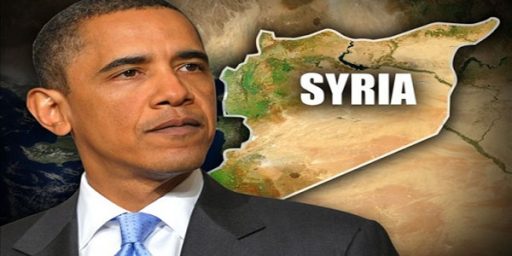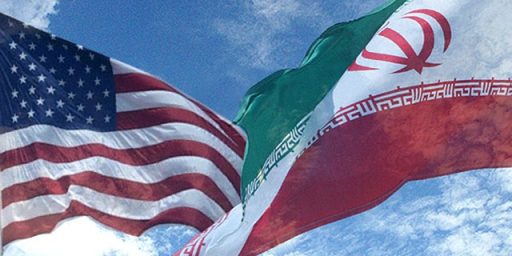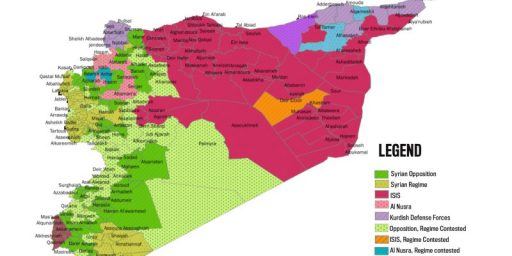All Things Pass
Will ISIS be able to consolidate and hold the territory it's taken in Iraq?
There are two contrasting views of events in Iraq that I thought might be worthy of consideration. At War on the Rocks Mark Stout counsels patience because ISIS will find it impossible to consolidate and hold the territory they’ve taken:
ISIS (the Islamic State of Iraq and Syria) now holds substantial swathes of territory and may have something like $2 billion in cash, a fleet of armored vehicles and probably more small arms than it knows what to do with. Unusually among jihadist groups, ISIS has focused in Syria on governance beyond just shooting, beheading, and crucifying people it doesn’t like. Presumably it will do the same in Iraq.
However, this will not last. For an explanation why, we can turn to probably the most brilliant jihadist strategist to have touched a keyboard: Abu Musab al-Suri. He believed that “open fronts,” such as the 1980s jihad against the Soviet Union, efforts intended to liberate and hold territory, are unlikely to succeed. The simple fact is that they cannot stand up to modern military power backed up by modern intelligence. Instead, he recommended a turn toward individual jihad because it avoided the enemies’ strengths. In other words, Al-Suri would say that the more cities ISIS captures, the more money it has to keep track of, the more armored vehicles it acquires, the more social services it has to organize and deliver, the more it is setting itself up for a fall. These things have all sorts of pernicious effects from the point of view of security: they tie ISIS to fixed territory, they create networks that can be mapped and exploited, and they provide targets to airpower and artillery. RAND analyst Blake W. Mobley, a former CIA counterintelligence officer and author of Terrorism and Counterintelligence, sums up the issue (albeit with regard to different case studies) this way: “controlled territory places a challenging but guaranteed high-value target directly in the…sights” of the terrorists’ adversaries.
That offers a bleak sort of encouragement. Bleak because the terrorist army could create a substantial amount of carnage and misery before it inevitably (in Dr. Stout’s view) fails. It could start conducting operations in Baghdad and the Baghdad environs. It could spread its efforts to Jordan.
Pat Lang sees the advancing Sunni Arab forces as being somewhat more diverse than Dr. Stout apparently does characterizing it with the following equation:
“ISIS + Former Iraqi military people + Sunni Bedouin tribes = Rebel Army in Iraq”
The media accepts the simplistc idea that ISIS, an AQ affiliate, is the sole actor in this campaign on the anti-Shia side. In fact, this is a coalition largely balanced between ISIS, former Iraq Army fighters and officers (that is why they have moved as though Guderian or Rommel was in charge and can fly helicopters) as well as Sunni bedouin tribesmen under their own sheikhs.
The Rebel Army’s advance to the south has followed the classic pattern of modern maneuver warfare in “hauling ass, bypassing the non-essential, and letting the following infantry mop up.” Thus the advance to and seizure of Mosul was immediately followed by a quick advance to Tikrit and then to further south. IMO ISIS is not capable of organizing this kind of operation. They are more suited to head chopping and beard measuring in occupied towns.
Just as this diverse group’s military capabilities are different so, too, may be their administrative and organizational abilities. A largely Sunni Arab officer corps assisted Saddam Hussein in controlling Iraq’s Shi’a Arab majority for decades.
Dr. Stout advises that “this, too will pass”. All things do. There is no such thing as a permanent order. Whether Dr. Stout’s or Col. Lang’s views are more predictive of how events unfold in Iraq we will know in the fullness or time. That, too, will determine whether the contours and timeframe in which they unfold will prove tolerable to us or Iraq’s neighboring countries.







Anyone see that that POS Bremer had the nerve to write an Opinion piece in the WSJ? Can’t he just play I heavy traffic somewhere
Sounds like a rephrasing of how it’s always easier to destroy than create, to terrorize rather than govern.
What will ISIS achieve? Unknowable, but it will involve a LOT of dead bodies. They don’t know how to not kill, kill in mass numbers, kill any who don’t support them adequately, kill at random, kill brutally and inhumanly.
The War Nerd:
“This is one of those dramatic military reverses that mean a lot less than meets the eye. The “Iraqi Army” routed by ISIS wasn’t really a national army, and ISIS isn’t really a dominant military force. It was able to occupy those cities because they were vacuums, abandoned by a weak, sectarian force. Moving into vacuums like this is what ISIS is good at. And that’s the only thing ISIS is good at.
“ISIS is a sectarian Sunni militia—that’s all. A big one, as militias go, with something like 10,000 fighters. ….
“But we’re still talking about a conventional military force smaller than a division. That’s a real but very limited amount of combat power. What this means is that, no matter how many scare headlines you read, ISIS will never take Baghdad, let alone Shia cities to the south like Karbala. It won’t be able to dent the Kurds’ territory to the north, either. All it can do—all it has been doing, by moving into Sunni cities like Mosul and Tikrit—is to complete the partition of Iraq begun by our dear ex-president Bush in 2003.”
The whole of it is worth traveling over and reading it.
@OzarkHillbilly: Second that. The War Nerd piece is a must read. Especially follow the “fat armchair jihadis” link in the middle of the article.
@Mike: Bill Kristol was on Morning Joe, showing no evidence of having learned anything, ever.
Thirty Years’ War redux?
The Sykes-Picot division of the MIddle East may fall apart completely over the next decade. It simply doesn’t make sense any longer.I don’t see Iraq or Lebanon surviving, and Syria is on life support.In the last decade, people had lots of fun drawing New Maps of the Middle East.
You can find one drawn by a retired US army officerhere.
Also good: Juan Cole weighs in:
ISIS is not going away easily. Iran has been unable to stop them in Syria and i don’t know why it would be any different in Iraq. Iran may “recapture” the northern cities, but these guys are here to stay. They will harass and intimidate for years to come. The Maliki government is too weak and corrupt to bring the country together. It’s telling that Russia & China want no part of this mess.
we should follow their example.
@Cletus:
Right, but is anyone surprised that a few years after a civil war, a fragmented state has a militia that has the capability of harrassing and intimidating?
The post above doesn’t deny this. Your comment seems to indicate that, on some level, they are unmoveable because Iran (?) hasn’t been able to kick them out of Syria. Well, Iran doesn’t have an army stationed in Syria. Iraq does have a military, and has the resources to enlarge their forces at a much quicker pace than ISIS. Furthermore, the Kurd forces are already kicking ass and taking names in the north*
You know how in Risk its impossible to not lose the middle Asian territories to a smaller army, but you know that, in the end, your superior territories and military count will of course win? Think of it that way.
*Correct me if I’m wrong. I haven’t really read about the Kurds in the last two days, and I imagine the situation is somewhat fluid.
@stonetools:
First, your map source is a low-brow conspiracy mongering site (and the map referred to is nonsense).
Second, the borders are not going to change, that is naive fantasy. Not that the borders are excellent, but they are not going to change.
Third, Lebanon is not going to disappear, this is just a bizarre prediction.
@Neil Hudelson:
I don’t know if I would classify Iraq as actually having a military. The “military” is more loyal to their local tribal leaders and imans than they are to the central government. Iran may send a sizable force but I think even they are reluctant to do that. Even if they retake all the land, ISIS will continue to function as a terrorist organization. They are well funded and I’m sure recruitment is way up this week. I see their backers like Saudia Arabia stepping up their support to counter any Iranian-US cooperation,
As for the Kurds, Maliki is already talking about a conspiracy and pretty much doesn’t want their help. The first step to slowly fix this problem is for Maiiki to resign. Until he does that, I think the US should do Nothing.
@Lounsbury: In addition, it’s Ralph Peters, a neocon liar.
@Cletus:
Well, Maliki is an idiot. That doesn’t mean they are part of a conspiracy. If they are, then all those clashes and raids they are having on ISIS is some 11-dimensional chest.
@Neil Hudelson:
I don’t there is any conspiracy at all, but Maliki has to go. He’s way too polarizing a figure and pretty much treated the Sunnis like crap since the US withdraw from Iraq. Any type of compromise or coalition has to start with Maliki gone.
I’ll opine that ideally they should be allowed to stew in their own juices, all their neighbors will want them to fail, and even the ones that don’t will be very limited in their ability to help them. They will probably get weaker. A forcible removal of them now would almost certainly result in a lot of civilian casualties.
However, there are some problems which may force Maliki to charge. The pipelines. “ISISistan” really puts a crimp on a lot of folks ability to move oil, particularly the Kurds,. The humiliation of losing half the country will eventually remove him if he does not act.
I fear they may be doomed to a bloodbath.
@Cletus:
Agreed.